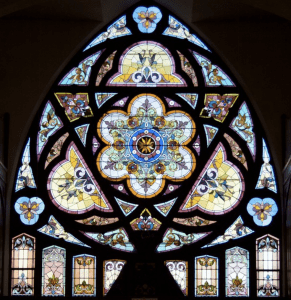After half a century of evangelical Christian Christmases, I’m still finding my way through the season as an exvangetical. As a former choir director, my heart holds a special, often-conflicted place for the songs of Advent and Christmas. The lyrics resonate deep in my soul, since I learned many of them as a very young child – but I find some a bit unsettling.
This Christmas season, I want to dig into a few well-known hymns to understand their traditional message, and perhaps find new meaning in their beloved texts.
First up is “O Come O Come Emmanuel.” The text comes from an eighth century poem.
If you want some background music for this post, here is a lovely vocal performance of today’s hymn; if like me, you prefer instrumental-only background, this is really nice.)
As an ally of the Palestinian people in their struggle, I’ve always been a little uncomfortable with this hymn’s insistence on identifying with Israel, but I keep reminding myself that it’s ancient Israel – which has nothing in common with modern Israel, except a name. (Someday I’d like to write new text for this hymn that reframe it just a bit.)
Here are the four verses that I’m familiar with (there are more, but these are the ones in my denomination’s hymnal):
O come, O come, Emmanuel,
And ransom captive Israel,
That mourns in lonely exile here,
Until the Son of God appear.
Rejoice! Rejoice! Emmanuel shall come to thee, O Israel.
In this verse, we are expressing the imagined cries of the Israelites as they wander in the wilderness. Here, they recognize that even though they have been freed from slavery in Egypt, they are still “captive” and in need of a savior. They mourn, but in hope that “Emmanuel (God with us) shall come” eventually.
As we move to verse 2, we find ourselves out of the wilderness, but now we strive to overcome temptation:
O come, Thou Rod of Jesse, free thine own from Satan’s tyranny;
From depths of hell Thy people save,
And give them victory o’er the grave.
Rejoice! Rejoice! Emmanuel shall come to thee, O Israel.
Here we identify with Israel’s struggle against “Satan’s tyranny,” and the apparent struggle to stay out of hell and eventually make our way to heaven.

They’re interesting lines, especially since today, we tend to operate from a place of absolute certainty about heaven and hell (a topic that I’ve dealt with and will return to). There is no struggle for “us” – we’ve already arrived in the center of God’s will, simply by being “saved.” There is no hope for “them” – original sin means they’re doomed (unless they become one of “us”).
We’ve forgotten what Jesus said in Matthew 7:21-23 –
“Not everyone who says to me, ‘Lord, Lord,’ will enter the kingdom of heaven, but only the one who does the will of my Father who is in heaven. Many will say to me on that day, ‘Lord, Lord, did we not prophesy in your name and in your name drive out demons and in your name perform many miracles?’ Then I will tell them plainly, ‘I never knew you. Away from me, you evildoers!’
As I’ve said often, Jesus told us clearly what qualifies us to spend eternity in God’s presence (spoiler: it’s not praying the Sinner’s Prayer). We could stand to be more attentive to his teaching.
In verse 3, we no longer fear “Satan’s tyranny” or the “depths of hell” – but we battle against human despair:
O come, Thou Dayspring, from on high,
And cheer us by Thy drawing nigh;
Disperse the gloomy clouds of night,
And death’s dark shadows put to flight.
Rejoice! Rejoice! Emmanuel shall come to thee, O Israel.
(This verse is a reference to Luke 1:78-79, which is actually a prophecy by Zacharias, presumably about his son, John.)
Today, this verse might ring more true to us than the others, as many of us struggle with depression. We are reminded to look toward the horizon and eagerly await the sunrise (the meaning of “dayspring”). We can rejoice in anticipation – Emmanuel shall come. (We can also take our Zoloft.)
The next verse takes to the threshold of eternity:
O come, Thou Key of David, come
And open wide our heav’nly home;
Make safe the way that leads on high,
And close the path to misery.
Rejoice! Rejoice! Emmanuel shall come to thee, O Israel.
This is the final anticipation – the ultimate end of the misery of wandering, temptation, and despair, and the gates unlocked and flung wide to heaven.
In this image, Emmanuel is not coming to us. We’re going to Emmanuel. Not so much “God with us” as “us with God.”
Ultimately, “O Come O Come Emmanuel” is a song of assurance in the faithfulness of God. Even when I feel like I’m lost in a wilderness, or oppressed or depressed, even when God doesn’t seem to be here, he is near in our struggles. He shall come, and in that assurance, I can rejoice. I like that.
My exvangetical take.
(If you are energized by challenges to the evangelical status quo, you’d enjoy my blog. Sign up for my free newsletter here!)
(If you would like to comment, please pop over to my Facebook page. All of my posts are there and open to constructive comment! I welcome your thoughts. And don’t forget to subscribe to my newsletter!)
OTHER POSTS THAT YOU MIGHT LIKE:
Ramadan for Christians: then sings my soul, “subhanallah”
The significance of Baby Jesus as a person of color
White Savior Syndrome: a brief case study
We’ve made God in our image, and we’re answering our own prayers
FEATURED IMAGE: “Church Stained Glass” by DeaPeaJay is licensed under CC BY-SA 2.0













